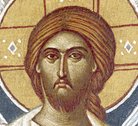The title of Ascetical Homily 69 is shown at left, color-coded to indicate the differences in various editions.
The purple text is the extent of the lighter ink for the title in Vatican Syriac 124 shown on the previous page; as mentioned there, it breaks off in mid-sentence and reverts to black ink, though the title continues.
The green text is in the Syriac and in the older Greek MSS, but not in Theotokis’s 1770 printed edition or Vatican Sinai Greek 605 to which it is almost identical.
The blue text is the last line of the title in Bedjan’s text, but the first line of the homily in the Greek texts and in our English edition. By making this the first line of the homily, we avoid the disorientation that would be caused by beginning it with the “For” of the following sentence, but are required to add the bracketed [even men of advanced virtue] to make the meaning clear.
Were we not following typographical conventions, but presenting the homilies more in the way that the manuscripts do, then the arrangement at left could follow the Syriac texts faithfully without the need for a bracketed gloss; and the smoother typographic transition from title (red) to homily would allow us to begin it with “For aberration . . .” without confusion and without unduly emphasizing “aberration.”
The title to Homily 70, shown on the next page, provides the epilogue.
Holy Transfiguration Monastery Publications, Inside our Books and the Sources behind them, is a companion site to www.thehtm.org.
Copyright © 2012, Holy Transfiguration Monastery, Brookline, MA. All rights reserved. Home Page | About • Contact | Terms of Use
Textual Questions: 7. Homily Sixty-nine • Conclusion

On true knowledge, and on temptations, and on how one ought to know clearly that not only certain lesser, weak, and untrained men are tempted, but also those are tempted who have been accounted worthy of dispassion for a time, who have achieved perfection in their manner of thought, and have in part drawn near to the purity that is conjoined with mortification, and have been raised above the passions in so far as this is permitted by God while men are in this world, under the yoke of life conjoined to the passionate flesh: they have a contest, and are vexed with passions because of the flesh, and in [God’s] mercy they even suffer abandonment on certain occasions because of the danger of pride
How often [even men of advanced virtue] transgress, and through repentance heal their souls, and grace accepts them! For aberration passes without distinction through every rational nature, and at every hour variations pass over all men; the discerning man will find many occasions to understand this.
On true knowledge, and on temptations, and on how one ought to know clearly that not only certain lesser, weak, and untrained men are tempted, but also those are tempted who have been accounted worthy of dispassion for a time, who have achieved perfection in their manner of thought, and have in part drawn near to the purity that is conjoined with mortification, and have been raised above the passions in so far as this is permitted by God while men are in this world, under the yoke of life conjoined to the passionate flesh: they have a contest, and are vexed with passions because of the flesh, and in [God’s] mercy they even suffer abandonment on certain occasions because of the danger of pride, – and how often they transgress, and through repentance heal their souls, and grace accepts them. For aberration passes without distinction through every rational nature, and at every hour variations pass over all men; the discerning man will find many occasions to understand this.
